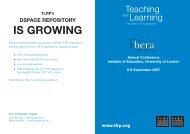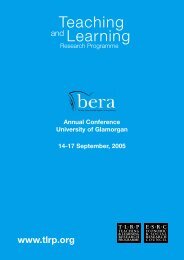Teachers - Teaching and Learning Research Programme
Teachers - Teaching and Learning Research Programme
Teachers - Teaching and Learning Research Programme
Create successful ePaper yourself
Turn your PDF publications into a flip-book with our unique Google optimized e-Paper software.
8<br />
The dominance of Curriculum Development, with the relatively large number of<br />
distinctive additions, reflects the continuous changes made in this area since the<br />
introduction of the National Curriculum. Perhaps more interesting are the additions made<br />
under the heading Aspects of <strong>Learning</strong>, including the issue of independent learners. In<br />
the United States, the increased emphasis on teaching for underst<strong>and</strong>ing (Good <strong>and</strong><br />
Brophy 1994) has concentrated on helping teachers to ‘scaffold’ knowledge rather than to<br />
present it to pupils directly. The aim is to provide a supporting structure within which<br />
pupils can learn to think for themselves. This not only involves what Shulman (1994)<br />
terms strategic knowledge (what it is legitimate to say or do in a domain or discipline <strong>and</strong><br />
what ‘breaks the rules’) but also self-knowledge (knowledge of ourselves as learners).<br />
This latter type of knowledge involves the ability to regulate one’s thinking processes by<br />
monitoring progress <strong>and</strong> identifying errors, so that, as advocated by Ann Brown (1990),<br />
instead of talking with adults or peers the pupil holds a conversation with him (her) self.<br />
Hughes (1996) has reported similar concerns in the UK.<br />
Of the remaining issues listed, those under Home School Links probably stem, in part,<br />
from the concerns of principals with the recent government emphasis on parental<br />
contracts, social exclusion <strong>and</strong> truancy.<br />
The Perceived Value of Educational <strong>Research</strong><br />
In the final section of the questionnaire respondents were asked to rate on a five-point<br />
scale eighteen statements about the value of educational research for teachers. In general,<br />
research evidence was valued when it focused on classroom action, tackled specific<br />
aspects of teaching or demonstrated effective learning. Less valued was the capacity to<br />
help teachers design their own research, or to enable them to interpret research data for<br />
their own benefit. For ease of interpretation the ratings given for each of the eighteen<br />
statements were subjected to a process of statistical analysis known as factoring. This<br />
produced two distinct scales that were internally consistent in the sense that all the<br />
statements on one scale had more in common with each other than with any statement on<br />
the other scale.

















